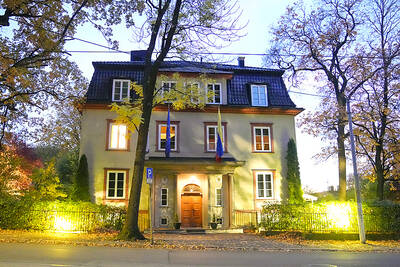A dozen 600-liter barrels full of metal brine sit on a warehouse floor ready to be shipped abroad for analysis, the first step in Bolivia’s quest to exploit vast lithium deposits in the Uyuni salt flats.
Bolivia has half of the world’s known reserves of lithium — a key mineral used especially in rechargeable batteries, as well as everything from cell phones and laptops to electric cars.
With demand for lithium expected to boom in coming years, Bolivia — one of the poorest countries in South America — is sitting on something potentially more valuable than a gold mine.
The lithium is found in Uyuni, the largest salt flats in the world.
Bolivian officials say there are 100 million tonnes of lithium under this desolate, 10,000km2 tourist attraction near the border with Chile, 3,650m above sea level.
The state-run Bolivian Mining Corp (Comibol) is sending the samples to the French Bollore Group, Japan’s Sumitomo Corp and South Korea’s Korea Resource Corp to study the mineral composition of the salt flats.
Each barrel that leaves Uyuni contains lithium, along with potassium chloride, potassium sulphate, boric acid and magensium chloride, in different proportions that, in the initial stage, are obtained via evaporation.
Under the tough salty surface there is an ocean of brine where the lithium is found.
Miners reach the briny layer by drilling a hole and sinking a tube — with an opening 15cm in diameter — 5m to 200m below the salty surface.
Officials say the Uyuni’s natural beauty will not be harmed by the drilling because the holes are covered up once the brine is removed, heavy machinery flattens the site and rain eventually erases all traces of human activity.
Marcelo Castro, director of the state-run Lithium Pilot Plant, located on the southern edge of the salt flats, estimates there are a good 100 million tonnes of lithium at the site.
Lithium extraction “is not only important for Bolivia because of the economic resources it will generate, but for the whole world, because being a source of clean energy it will help mitigate global warming,” Castro said.
He will be in charge of getting the pilot plant, currently being built at a cost of US$6 million, up and running. Next year it is expected to produce some 40 tonnes a month of lithium carbonate, a compound used in medicine, the generation of energy, glass and construction materials.
The government plans to sink US$300 million to US$400 million into the project’s initial phase. Castro said that cost would be covered “100 percent” by the government.
The second phase involving the production of lithium metal will require an US$800 million investment which it is expected the Japanese, Korean and French concerns will back through investment and cooperation agreements.
The final phase of the project calls for manufacturing lithium batteries.

Police in China detained dozens of pastors of one of its largest underground churches over the weekend, a church spokesperson and relatives said, in the biggest crackdown on Christians since 2018. The detentions, which come amid renewed China-US tensions after Beijing dramatically expanded rare earth export controls last week, drew condemnation from US Secretary of State Marco Rubio, who on Sunday called for the immediate release of the pastors. Pastor Jin Mingri (金明日), founder of Zion Church, an unofficial “house church” not sanctioned by the Chinese government, was detained at his home in the southern city of Beihai on Friday evening, said

Floods on Sunday trapped people in vehicles and homes in Spain as torrential rain drenched the northeastern Catalonia region, a day after downpours unleashed travel chaos on the Mediterranean island of Ibiza. Local media shared videos of roaring torrents of brown water tearing through streets and submerging vehicles. National weather agency AEMET decreed the highest red alert in the province of Tarragona, warning of 180mm of rain in 12 hours in the Ebro River delta. Catalan fire service spokesman Oriol Corbella told reporters people had been caught by surprise, with people trapped “inside vehicles, in buildings, on ground floors.” Santa Barbara Mayor Josep Lluis

The Venezuelan government on Monday said that it would close its embassies in Norway and Australia, and open new ones in Burkina Faso and Zimbabwe in a restructuring of its foreign service, after weeks of growing tensions with the US. The closures are part of the “strategic reassignation of resources,” Venezueland President Nicolas Maduro’s government said in a statement, adding that consular services to Venezuelans in Norway and Australia would be provided by diplomatic missions, with details to be shared in the coming days. The Norwegian Ministry of Foreign Affairs said that it had received notice of the embassy closure, but no

A missing fingertip offers a clue to Mako Nishimura’s criminal past as one of Japan’s few female yakuza, but after clawing her way out of the underworld, she now spends her days helping other retired gangsters reintegrate into society. The multibillion-dollar yakuza organized crime network has long ruled over Japan’s drug rings, illicit gambling dens and sex trade. In the past few years, the empire has started to crumble as members have dwindled and laws targeting mafia are tightened. An intensifying police crackdown has shrunk yakuza forces nationwide, with their numbers dipping below 20,000 last year for the first time since records